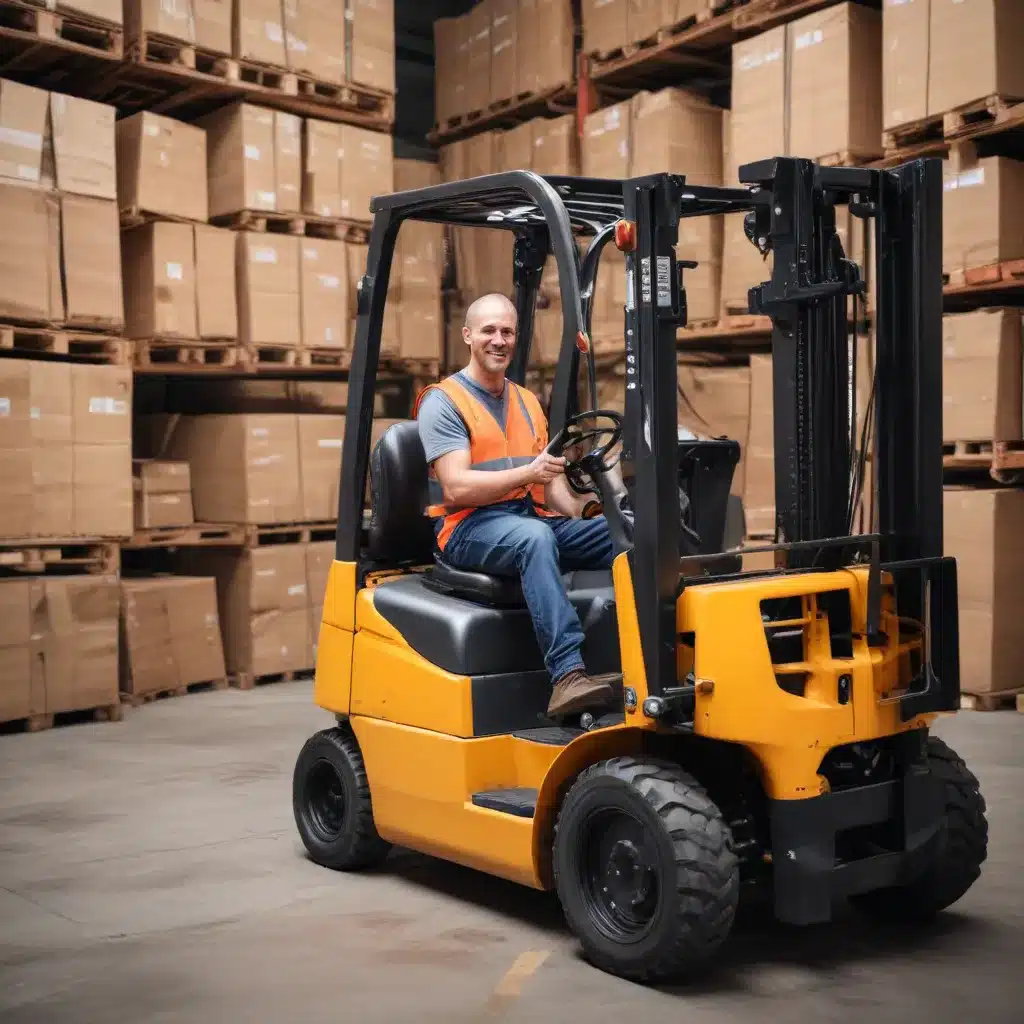
The Importance of Emotional Intelligence for Forklift Operators
As a seasoned industry expert, I’ve observed that forklift operators play a crucial role in the smooth functioning of any warehouse or logistics operation. Beyond their technical expertise in operating forklifts safely and efficiently, forklift operators must also possess strong emotional intelligence and communication skills to ensure seamless collaboration and teamwork.
Emotional intelligence, or EQ, refers to an individual’s ability to recognize, understand, manage, and reason with emotions. For forklift operators, this skill set is essential for navigating the dynamic, fast-paced warehouse environment and interacting effectively with coworkers, supervisors, and others. A forklift operator with high EQ can better anticipate and respond to the needs of their team, defuse tense situations, and foster a positive, collaborative work culture.
Understanding the Role of Emotional Intelligence
Emotional intelligence encompasses four key competencies:
-
Self-Awareness: The ability to recognize one’s own emotions, strengths, weaknesses, and biases, and understand how they impact behavior and decision-making.
-
Self-Management: The capacity to regulate and control one’s emotions, impulses, and reactions in a constructive manner, and adapt to changing circumstances.
-
Social Awareness: The skill to perceive and understand the emotions, needs, and concerns of others, and demonstrate empathy and consideration.
-
Relationship Management: The aptitude to communicate effectively, resolve conflicts, and build strong, collaborative relationships with colleagues and customers.
For forklift operators, these competencies translate to critical on-the-job behaviors, such as:
- Self-Awareness: Recognizing when stress or frustration may be impacting their driving performance and taking steps to manage those emotions.
- Self-Management: Remaining calm and composed under pressure, such as when dealing with a malfunctioning forklift or a tight delivery schedule.
- Social Awareness: Tuning in to the nonverbal cues and emotional states of coworkers to anticipate potential issues or conflicts.
- Relationship Management: Communicating clearly and respectfully with team members, supervisors, and customers to resolve problems and maintain a cooperative work environment.
By developing and applying these emotional intelligence skills, forklift operators can enhance their overall effectiveness, improve workplace dynamics, and contribute to the success of the entire organization.
Strengthening Emotional Intelligence and Communication
Forklift operators can take several steps to cultivate their emotional intelligence and communication abilities:
Self-Awareness and Reflection
Regularly reflect on one’s own emotional responses, triggers, and patterns of behavior. Keep a journal to track emotions and identify areas for improvement. Seek feedback from colleagues and supervisors to gain an outside perspective.
Active Listening and Empathy
Develop active listening skills by fully concentrating on the speaker, seeking to understand their perspective, and responding with empathy and care. This demonstrates respect and can help resolve conflicts more effectively.
Adaptability and Flexibility
Maintain a flexible mindset and be willing to adjust communication styles and approaches based on the situation and the needs of the audience. Adapt to changing priorities and unexpected challenges with composure.
Conflict Resolution and Negotiation
Learn strategies for constructively addressing disagreements and finding mutually beneficial solutions. Utilize active listening, compromise, and problem-solving to navigate tense situations.
Assertiveness and Confidence
Communicate ideas and concerns with clarity and confidence, without being aggressive or passive. This can help forklift operators advocate for their needs and the needs of their team.
Continuous Learning and Growth
Seek out opportunities for professional development, such as training programs or mentorship, to continually enhance emotional intelligence and communication skills. Stay up-to-date on industry best practices and trends.
By focusing on these key areas, forklift operators can develop a well-rounded skill set that extends beyond technical expertise, positioning them as invaluable assets to their organizations.
The Impact of Emotional Intelligence on Forklift Operations
When forklift operators possess strong emotional intelligence and communication skills, the benefits can be far-reaching:
Improved Safety and Efficiency
Emotionally intelligent forklift operators are better able to recognize and manage stress, making them less likely to engage in risky behaviors that could jeopardize safety. They also tend to communicate more effectively with their team, ensuring smooth coordination and increased productivity.
Enhanced Collaboration and Teamwork
Forklift operators with high EQ can foster a positive, supportive work environment by empathizing with coworkers, resolving conflicts constructively, and promoting a collaborative spirit. This can lead to improved morale, job satisfaction, and a stronger sense of camaraderie.
Better Customer Service and Reputation
Forklift operators who communicate clearly and handle interactions with customers, suppliers, and other stakeholders with professionalism and empathy can contribute to the organization’s overall reputation and customer satisfaction.
Increased Job Advancement Opportunities
Employees who demonstrate strong emotional intelligence and communication skills are often viewed as valuable contributors and leaders within an organization. This can open the door to promotions, specialized training, and other career advancement opportunities.
Reduced Turnover and Absenteeism
When forklift operators feel respected, understood, and supported, they are less likely to experience job-related stress or burnout, leading to decreased turnover and absenteeism rates.
By prioritizing the development of emotional intelligence and communication skills, forklift operators can not only enhance their individual performance but also positively impact the entire warehouse or logistics operation. This, in turn, can lead to improved productivity, increased profitability, and a more engaged, cohesive workforce.
Conclusion
In the fast-paced, high-stakes world of forklift operations, emotional intelligence and effective communication are essential skills that can set forklift operators apart and contribute to the overall success of their organizations. By cultivating self-awareness, empathy, adaptability, and conflict resolution abilities, forklift operators can strengthen interpersonal dynamics, foster a collaborative work environment, and deliver exceptional customer service – all while maintaining a relentless focus on safety and efficiency. As the industry continues to evolve, forklift operators who invest in developing their emotional intelligence will be well-positioned to navigate the challenges and opportunities that lie ahead.
For more information on forklift reviews, safety guidelines, and industry trends, be sure to visit Forklift Reviews.

